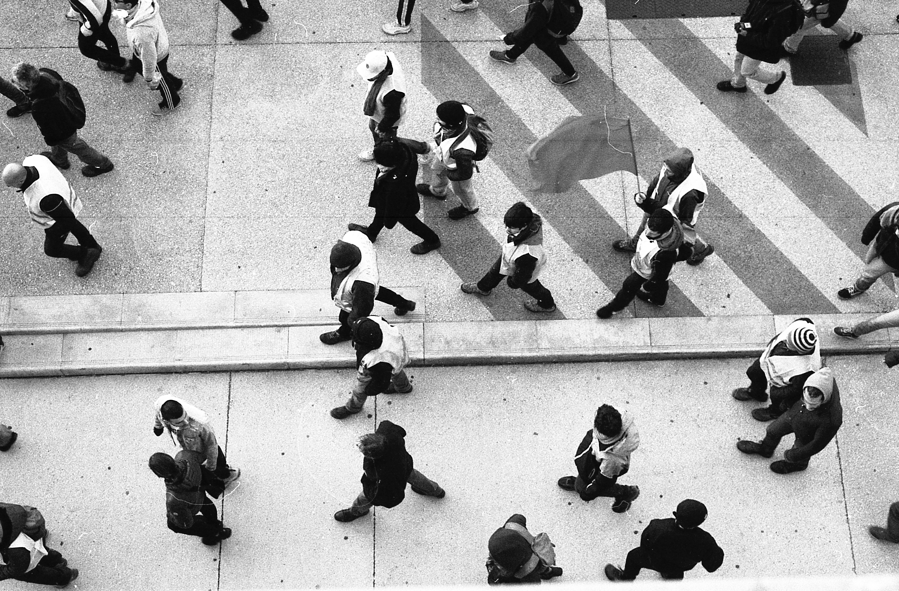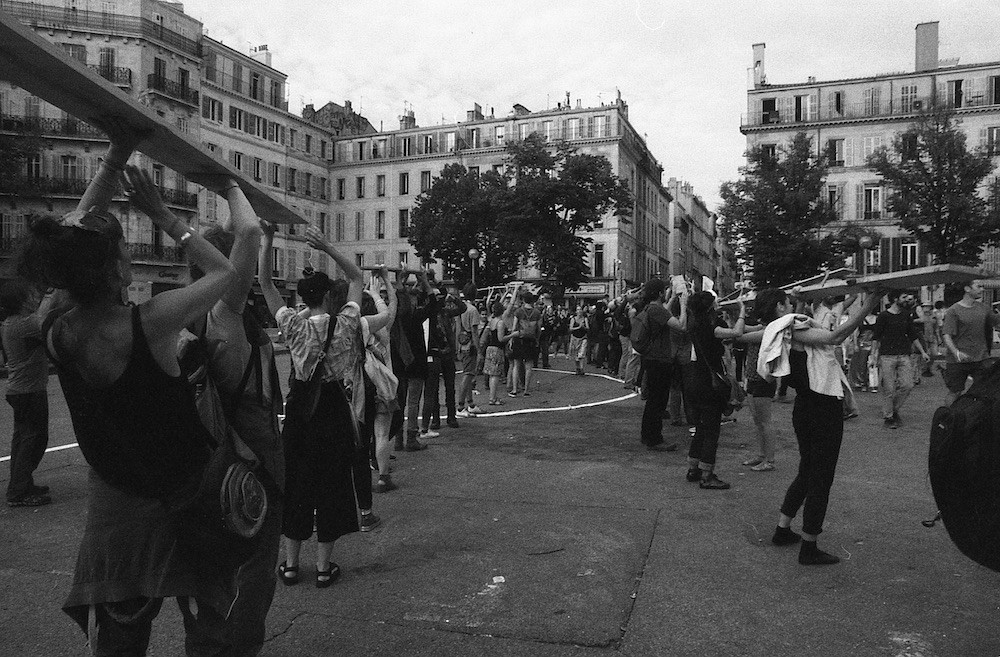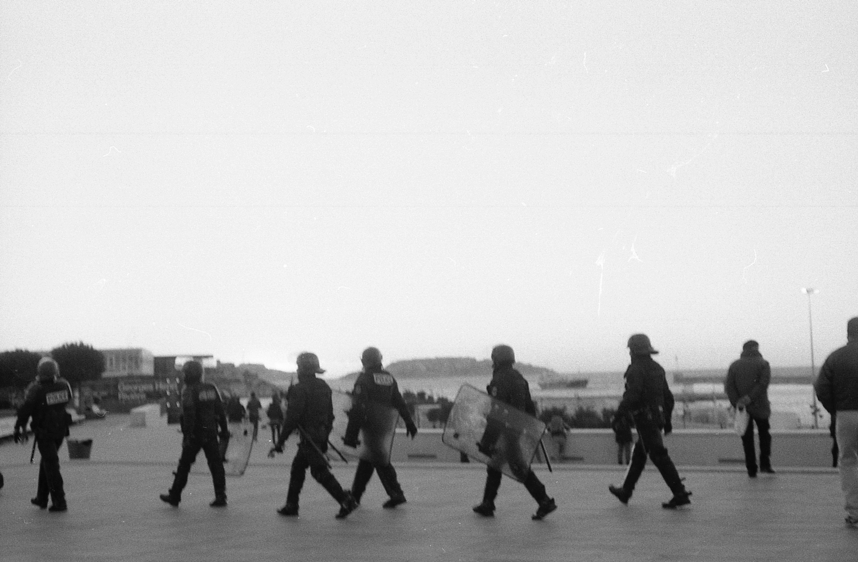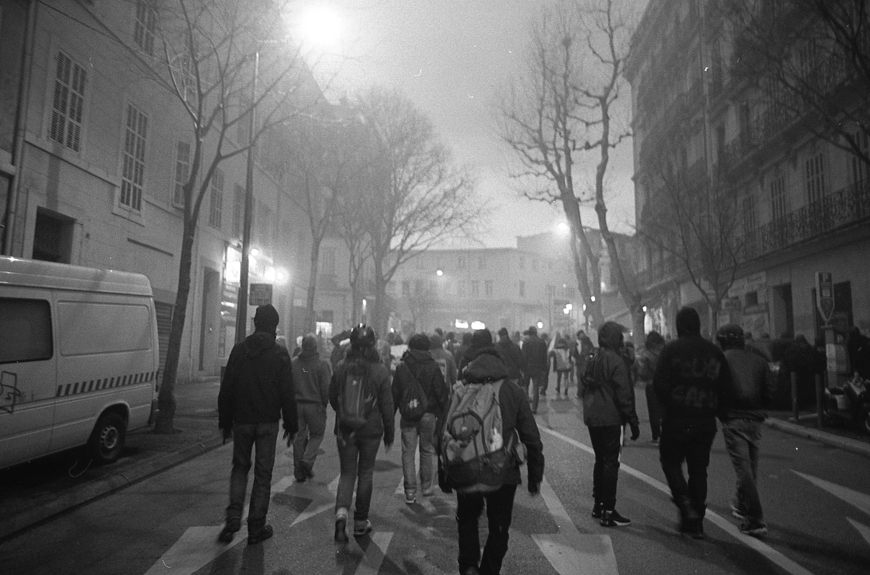
The dark blue hyacinth offered an opening in time. It was late December; it was the beginnings of Act V; it was an impossibility. And yet here it was, peeking up through the muddled pavement. I looked up to the sea of bright yellows, brief murmurings fanning out among the crowds. I looked up further, higher; someone skywriting “divination 4 strategy” against the clouds. Ça gaze?
And so I began with a note to myself—is it ever safe to say “we”?
At night the blockade would burst into pieces, rebuilding itself again and again. The flicker of a streetlamp meant the imminent bricking of a car; a garbage bin set ablaze. Barricades proliferated. Shop windowpanes sang loudly of their desires, splashed only by the slightest of rain. I could hear E throwing up in the flowerpots, still reeling from the tear gas. Someone pulled on a balaclava and suddenly the only place you could look were the eyes.
Night flooded the streets, hesitating the senses, and the more dandelion gilets jaunes petered off.
“Have you thought of the night, now, in other times, in foreign countries?” someone in literature once asked. Three whole days of rain and the trees were still thirsty. So sweetened by their plural existence. The bacu—the plainclothes brigade anti-criminalité—hung around corners, waiting to grab individuals from the crowd and drag them off into side streets, to beat them with batons or fists or feet or the butts of guns. It was the youngest—Marseillais kids on the pinnacles of puberty in their glowing tracksuits—and the oldest, who seemed the least afraid. Not braver, just not scared.
We were skeptical and we were stunned. In those moments someone was always changing tracks, rolling Rizla, chirpsing in doorways, rubbing graffiti onto nearby walls, passing on anecdotes through the crowd, like a pulse moving underneath the sea. Flares and firecrackers were alighted, elating an eventually quite moving feeling. Every little thing caused a quick backwards glance. What we had in those moments was an anti-literature of life, an afterthought reaching to become the first and foremost.
Les flics descended and we scattered in different directions. The zbeul had been announced. Everything was to be begun; not only that, but unlearned, and then at last begun. Some shrugged and headed for Bar du Peuple, some headed deeper into the streets. Between these modes of existence, the beginnings of a poem started to emerge:
Though it be the season of falling men
high on that bleak mountain plateau in southern France
I promise to try my hardest—
E throwing up in the flowerpots still reeling from the tear gas
“best
birthday ever” o humanity,
that shifting genre
I never knew I liked it—
its softly lit and clitoral fringes
fluctuating inside coastal paintbrush factories
turned opportunist galleries every painting left unchecked
Begin again:
who, what, where, when—
Movement depends on moments of collectivity, if not a totalizing unison of. It does not require that everyone involved dresses, shouts, or behaves the same—but it does require that all will know which way to run when the shit hits the fan. Like Zukofsky asserted of poetry, protest doesn’t compete; it is added to. Like poetry, movements, and moments, are not invented, but develop out of discourse, out of relations, out of real or imagined proximity and diffuse subjectivities. When are your poetics, your politics, not implicated in another’s?
Real intimacy requires collaboration. Towards the end of Franco’s totalitarian reign in 1975, Allan Kaprow’s Comfort Zones was interpreted in a small gallery in Madrid. Seven couples led performances experimenting with “territorial bubbles” and eye contact; collective action converging only “when the thought comes strongest”:
A and B, pressing against either side
of a closed door
trying to fit the outline of each other
saying, when the fit seems close, only “now”
repeating again and again until certain
Sometimes there is no possibility of repetition, the ability to try “again and again” until certain. In more recent times we had been known to crumble into many small states, and these small states were mobile. Everyone carried their own state with them, demanding a toll when another wanted to enter. “It’s an interclass movement,” say the Marxists. “This movement has oppressors,” say others. “This movement has a penchant for authoritarianism and populism,” say the anarchists. “This movement is anti-ecological,” say the environmentalists. “This is a conservative tax revolt,” mostly everyone agrees. Dubious flags flew in colors that symbolized both, oppositional sides. Their presence did not mean their hegemony; not everything that moves is red.
By anti-literature, I mean that in these moments it became less about whether the doing of the literature was itself a form of politics or not—whether it was necessary or desirable or impactful or possible—and so always bringing it back to that anodyne and shrill question of use-value, and more about the life of anti-literature itself. In actuality, its anti-ness existed mainly in relation to its for-ness, and in doing its own thing, it became, ironically, relatively “valuable.” Its complicity was no longer compartmentalized to single lines or single poems or single collections or single poets or single serving reading sermons, but grew to flesh-out gradually or at once into something quite beyond.
Among the burning barricades on La Canebière, people from different manifestations mingled with one another, or exchanged updates, or smirked at one another’s chosen aesthetics, or were ignored completely with a kind of flâneurial detachment. There were the yellow vests; there were those protesting the “renovation” of La Plaine; there were those mourning the deaths of eight people—Taher, Marie-Emmanuelle, Simona, Niasse, Fabien, Julien, Cherif, Ouloume—killed when two buildings in the first arrondissment collapsed, a result of unsafe housing conditions neglected by the city council.
One thing next to another doesn’t mean they touch. La Canebière was not so much a merging but a convergence. “We” don’t don the yellow vests; skeptical and stunned, we come with our own specificities, align only with ourselves and one another. A certain autonomous milieu… unsure of how to relate to a phenomenon that exceeds it. But this did not mean it wasn’t important to show up, to be another body, another witness on, or to, the streets. The poem continued as the crowd turned a corner:
out smoking on the steps
L invents a better version of the economy: flicking the ash,
letting it slowly settle
into absent snow
cement blocks advance
into the square
into crowds
slow-dawning dogs running out from the squatted kiosk
and someone, elsewhere says:
“five years later we are overwhelmed
by the shockwaves of empathy and at the same time
an absolute absence of political context”
the street rises to the occasion—
beautiful and laughing
High voltage lines, supermarkets, roundabouts, toll roads. I watched 2000 casseurs imagine an exclamation mark into existence. “She who denounces exempts herself,” wrote someone in an alleged letter from Venice. Total relativism is pretty close to nihilism, and nihilism is incredibly liberal. “Dear comrade, you have been trapped by the real,” wrote someone in an anonymous letter from Kyiv. No one could keep the situation under theoretical control.
In Spit Temple, Cecilia Vincuña writes:
In high school we studied poetry from Spain’s Golden Age by Góngora and Garcilaso. The kids hated it. No one could understand anything. The teacher would read a poem out loud and ask, “What does it mean?” No one dared to answer, but I stood up and offered an interpretation based on what I couldn’t understand. After hearing me, the teacher said, “But you are creating a new poem.” Inside of those poems, I felt I was in an earthly paradise.
Trams stopped running, patisseries slammed down their shutters, shopkeepers watching from their yet-to-be-broken windows. Next to the fountain at Réformés, a small group held YPG and YPJ flags, whooping back and forth with the passing crowd. Side by side, we occurred without excluding one another. It was as though friendships and affinities began to spread outwards, laterally across the streets in quiet confidence, rather than handed downwards as with inheritance or knitted jumpers or genetic diseases. Among the lighting of archives, to be recognized also means to be tabulated, monitored, regulated. I tried to think about the need for witness in relation to stories and to history and to movements. I tried to think about the need for witness as neither listener or teller, but as a generative presence—of that which has happened, or that which may happen, or that which brings that which has happened or may happen into existence again and again.
Does it matter how things are brought into being—movement, insurrection, poetry? Someone said, “There is no right-wing riot or left-wing riot; there are only riots, it’s a form.” Someone said, “But the form of this thing, it’s outside the Left.” Someone said, “The riot, it’s not just a form; its form is a content.” Ban en Banlieue by Bhanu Kapil tells of a blueprint that is also a building, a body, a book that “repeats a sentence until that sentence recuperates its power to attract, or touch, other sentences.” Ban is a girl growing up on the outskirts of London in 1979: “A black (brown) girl encountered in the earliest hour of a race riot, or what will become one by nightfall.” Walking home from school, Ban “lies down to die,” at the moment she hears glass shattering, “on the floor of the world.” Kapil writes, “I wanted to write a book that was like lying down.” Kapil writes, “I wanted to write a book about lying on the floor of England.” Kapil writes, “I want a literature that is not made from literature.”
“Keep reminding yourself that literature is one of the saddest roads that leads to everything,” André Breton proclaimed in Manifesto of Surrealism in 1924. “Just as insurrectionism as an ideology exists only when there is no uprising, populism exists only when the people are absent,” wrote Marcello Tarí. If “the people” have only ever existed as a spectral figure for the benefit of the state—under the pretense of outsourcing authority, or power, or blame, or desire—or as a seemingly homogenous mass of “ordinary” people: those not backed by wealth or particular passports or white supremacy, can there be “a people” of literature, a people of poetry? When a, or the, or all, or enough people are really in the streets, government cannot rule; the dichotomy between the individual and the group is false. I try to think about whether a “people” equals an “everyone” equals a “we.” “Toutes les mondes deteste la police!” the cortège de tête yell as cars are flipped, stacked with kindling and luxuriously set alight by present-day pétroleuses. Anything that can be dislodged is, and thrown. “My Hermès handbag!” a woman resurrected from 1967 cries. A sentence moves up against abstraction: “every time I write in lines it just degenerates into aesthetics.” Existing poetry’s survival rests on its inability to make itself real. I try to think about whether the “how” of things brought into being is aesthetics. I try to think about what the “what” alone of things could mean. I try to think about whether poetry necessarily equals literature, and therefore whether “a people” of poetry is necessarily a people of literature. I try to think of this not as a matter of content, accessibility, aesthetics, or even form—but rather as an ethics of doing. The poem reappeared in brief opening as we circled Cours Julien:
but M’s all
schoolboy dissertations
( ( ( ( wondering ) ) ) )
whether Sean Paul ate organic or not
on that long-haul flight to COP 21…
( ( ( ( wondering ) ) ) )
whether it was worth the poet flying 3000 miles
to read that poem—the one
about the destruction of coral reefs
witnessed another 7500 miles away…
tldr;
whether we should go straight back to sleep before we even wake up
our endless desire to grasp things
A’s endless chatty grief
( ( ( ( wondering ) ) ) )
at what point does “alternative lifestyle”
become an alternate life—?
at no point
did I say I was convinced by the logical summation of things
Begin again:
that, they, those, them—
I had a hard time knowing when I was inside the protest, and when I was outside poetry. This was not to divulge a binary, or suggest that an anti-literature of life was necessarily a literature of opposition or subversion or transgression. I wasn’t outside anything: I wasn’t inside it either. Mostly we wanted to feel at the center of things. It was not about the story, nor was it even about how the story is told. Mostly it is about how a story is felt through joining perspectives; a proliferating, running commentary on the capabilities of form. Mostly I did not want to rule out the possibility that poetry or protest or collectivity or solitude could grow to become that which it is not, or that which it is not yet. Mostly I wanted innovation and degeneration and to believe in the idea of both an “I” and a “we” and to avoid admitting sentimentality and to talk about the past and the present and the future all in one long single sentence, and camembert, all at the same time. I didn’t want the body to forget itself, to become a restriction to Rousseau’s rêveries, rather than a spontaneous manifestation upon occasion. “We are living, saturated inside the poetic device of conceit,” a teacher in an adult education class once said. I didn’t want the poem to be two things leaning up against one another; one inside, one outside, to make the world more “perceivable.” Protest does work. But “protest” isn’t the same as “a protest,” and some protests work better than others. There is no essential nature to a set of words arranged on the page, to an assembly of bodies accumulating on the streets. Maybe form can offer a capacious, deteriorating trace of our lives; “the widest angle of vision before vision fails to mean,” as a line in Under Flag by Myung Mi Kim registers. Maybe form can be not Aristotle’s container in which things are placed, but the means that makes this placing possible.
“I wanted to study what happens to bodies at the limit of their particular life,” Kapil writes. “There was never a way to do this in writing.” To be a flâneur of the protest-turned-riot is to admit solitude as an organ of the social. Someone smashes a window and the glass wobbles in its frame before shattering. Inside night I can smell the tear gas floating through the boulevards and the cours, beneath trees and among foliage, drifting out across the water at Vieux-Port. The quartier’s old bars transformed into ice-cream parlours, their façades repainted in bright pastel colors. Eyes swell; sting and burn. There was no longer a foreground and a background, but a cognitive continuum; a lascivious and boundless perceiving. No subject position, but a distribution of subjectivity. There was little insight or message, and this was both arming and disarming. “Why do we fear the dark as unavoidable defeat when it alone is constant,” asks Rosmarie Waldrop in Lawn of Excluded Middle. Narratives were partial, incomplete; at risk of falling apart at any moment. I no longer desired the poem to be a witness—or even a generative presence—but a continuity, a textual experience of the unreadable, the unthinkable; not that which has happened or may happen, but that which has not happened or may never happen.
Looking back I suppose has nothing to do with what actually occurred. I became less interested in the formal qualities of movement than their emotional and sensual ones, which both became a form and yet resisted form. I began again with a list of luxurious devastation—loose dogs held aloft under streetlight, the techniques of the body growing to resemble a prisoner of a drop of water, the assertion of people as single letters, the glass bottles thrown at the flics—at shop fronts, at windshields, at one another. Can anything really make a multitude? Coherence is itself obscene, its doppelgänger romanticized as strategic instrument; as symptomatic hunger for innovation. “There is no way you can not have a poetics no matter what you do: plumber, baker, teacher you do it in the consciousness of making or not making yr world,” wrote Diane di Prima. “This movement is petit bourgeois because they have cars,” someone says. “All previous modes of resistance are insufficient to the current moment; it’s not like anything” someone says. “This movement is made up of the un-unionized: artisans, chauffeurs, lay workers,” someone says. “Who seriously believes the yellow vests are blockading the entirety of France for just one reason?” someone asks. “We are badly in need of a new poetics of protest,” someone declares, when the thought comes strongest. It is there that the poem encounters.
I work predominantly
in memory—
by the end we knew
the center was within us
Begin again:
why—
somewhere, still
thinking about us on the bus going across the marshes—
we will
find a way—
it is, it’s just
I want so much for this to be—
to use—
to become—
Begin again:
from these very fingers emerge
lightly knuckled read only by touch
because
the tips sing—
you don’t have to ask
———
A note on the title: ‘The We of A Position’ is borrowed from Tiqqun’s ‘Call’: “The We that speaks here is not a definable, isolated We, the We of a group. It is the We of a position.”
A note on the text: Alongside those already attributed above, some words/lines/ideas/images have been used/developed/reworked from the writings/words/conversations of/with Al, Djuna Barnes, Bechaela, Marianne Boruch, Anne Boyer, Cai, Clémence, Dimitra, Ediciones Inéditos, Etza, Euan, Flo, Donal Foreman, Forrest Gander, Heval Gelhat, Jean Genet, Jean-Luc Godard, Haukur, Nazim Hikmet, Sam Huber, Jazra, Jenni, Bhanu Kapil, Lewis, Liaisons, Rona Lorimer, Lucy, Matti, Steve McCaffery, Maureen N. McLane, Ana Mendieta, Nick, Adrienne Rich, Denise Riley, Lisa Robertson, Roses, Muriel Rukeyser, Alexey Samoedov, Leslie Scalapino, Ron Silliman, Sophie, Verity Spott, Catriona Strang, The Invisible Committee, Rebecca Tamás, Michael Taussig, Thabit, Paul Torino, Alèssi Dell’Umbria, Jack Underwood, Agnès Varda, Wim Wenders, Adrian Wohlleben, C.D. Wright, Stephanie Young, Zayn, Émile Zola.
Lotte L.S. is a poet living in Great Yarmouth, the furthest easterly outlier of England. She keeps an…
Read Full Biography






